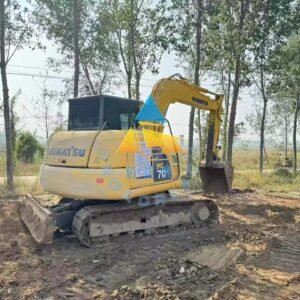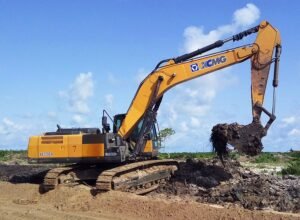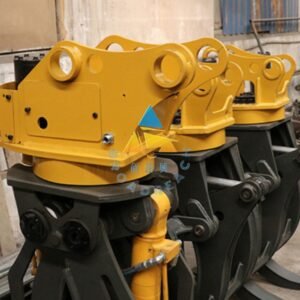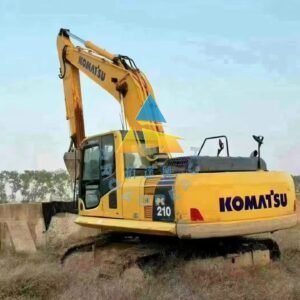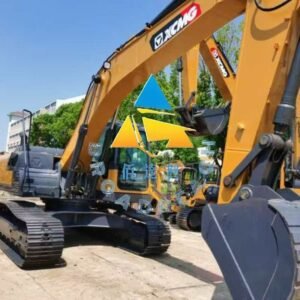BroadReach Construction Machinery Co., Ltd

Choosing Between New vs. Used Excavators: Key Considerations for Your Decision
When it comes to acquiring an excavator for your construction or landscaping business, one of the most significant decisions you’ll face is whether to buy new or used equipment. Both options come with their unique advantages and potential drawbacks. Understanding the key factors can help you make an informed decision that aligns with your needs, budget, and long-term goals.
1. Cost Considerations
The first factor most businesses consider when purchasing an excavator is the price.
- New Excavators: Generally, new excavators come with a higher upfront cost. However, they also come with the benefit of the latest technology, improved fuel efficiency, and warranties that cover repairs and maintenance for a set period.
- Used Excavators: The most significant advantage of buying a used excavator is the price. Used equipment can often be found at a fraction of the cost of a new one, allowing you to stretch your budget further. However, the cost savings may come with trade-offs in terms of performance, reliability, and maintenance needs.
2. Maintenance and Reliability
The condition of the excavator and its potential for future breakdowns are critical concerns when choosing between new and used machines.
- New Excavators: One of the main reasons people choose new excavators is their reliability. New machines are less likely to experience issues in the first few years of use, and they come with warranties that protect against defects and mechanical failures. Many new models also feature the latest improvements in durability and ease of maintenance.
- Used Excavators: With a used excavator, you’re buying equipment that has already been in operation, which means it could have wear and tear. While some used excavators can still offer excellent performance, others may require more frequent repairs or maintenance. The condition of a used machine largely depends on its previous ownership and the maintenance practices it’s undergone.
Before buying a used excavator, it’s important to have it thoroughly inspected by a qualified mechanic or dealer to assess its condition and potential repair needs.
3. Technology and Features
Excavators have evolved significantly in recent years, with new models offering cutting-edge technology and features that can enhance performance, safety, and fuel efficiency.
- New Excavators: New machines come equipped with the latest technological advancements. These may include GPS systems for precise digging, advanced hydraulics for better lifting capacity, and fuel-efficient engines. Many new excavators also have improved cab designs that increase operator comfort and productivity.
- Used Excavators: Older models of excavators may lack the modern technology found in newer machines. While they can still be highly effective, they might not have the same level of efficiency, safety features, or user-friendly interfaces. For some businesses, however, these features may not be essential for day-to-day operations.
4. Depreciation
Depreciation is another key factor to consider when deciding between new and used excavators.
- New Excavators: New excavators depreciate the most in the first few years. In fact, they can lose a significant portion of their value within the first 1 to 3 years. If you plan to sell the machine in the near future, you may not recoup as much of your investment as you would with a used machine.
- Used Excavators: The depreciation rate on used excavators is generally lower, as they’ve already gone through the steepest part of their value decline. Buying a used machine means you’re less likely to lose as much value in the first few years of ownership.
5. Financing Options
The ability to finance your excavator purchase is another important consideration.
- New Excavators: Manufacturers and dealers often offer attractive financing options for new excavators, including lower interest rates, deferred payments, and flexible loan terms. These options can make the higher upfront cost of a new machine more manageable.
- Used Excavators: Financing a used excavator can be more challenging, as lenders may not offer as favorable terms for older equipment. The loan amounts may also be lower, depending on the machine’s age and condition.
6. Longevity and Usage
The expected lifespan and usage of the excavator should influence your decision.
- New Excavators: New excavators are ideal for businesses that need equipment that can endure heavy usage for many years. With proper maintenance, a new machine can last for 10,000 to 20,000 hours or more, providing long-term value.
- Used Excavators: If your excavator will be used less frequently or for lighter tasks, a used machine might be more than sufficient. Some older machines may still offer excellent longevity if they’ve been well-maintained, making them a great option for less demanding jobs.
7. Resale Value
While you may not initially consider reselling your excavator, it’s always good to think about its potential resale value down the road.
- New Excavators: New machines tend to have higher resale value, especially if you’ve kept up with regular maintenance and repairs. However, the resale value will still drop significantly in the first few years due to depreciation.
- Used Excavators: Depending on the make and model, used excavators may retain a reasonable resale value. Machines that are well-known for their durability and performance tend to hold value better than others.
Conclusion
Choosing between new and used excavators ultimately depends on your specific needs, budget, and usage requirements. If you have a larger budget and require the latest technology, along with fewer maintenance concerns, a new excavator may be the right choice. However, if you’re working with a tighter budget and can manage the risks associated with an older machine, a used excavator can be a cost-effective option that still delivers solid performance.
By weighing the factors of cost, maintenance, technology, and long-term value, you can make a decision that best fits your business goals and operational needs. Whether new or used, an excavator is a significant investment, so it’s crucial to make an informed choice that maximizes your return on investment.

